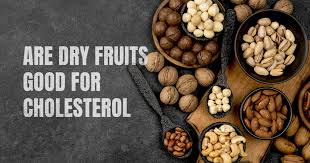Dry fruits to lower cholesterol | Heart-healthy diet tips

Dry Fruits That Help Reduce Cholesterol
Introduction
Cholesterol is a significant health concern, as high levels can increase the risk of heart disease and stroke. While lifestyle changes and medication can help manage cholesterol, diet plays a crucial role. Dry fruits, packed with essential nutrients, fiber, and healthy fats, can be an excellent natural remedy to lower cholesterol levels. In this article, we will explore the best dry fruits that help reduce cholesterol and how they contribute to heart health.
How Dry Fruits Help Lower Cholesterol
Dry fruits contain essential compounds that work together to reduce bad cholesterol (LDL) and boost good cholesterol (HDL):
- Fiber: Helps bind cholesterol and remove it from the body.
- Healthy Fats: Unsaturated fats lower LDL and increase HDL levels.
- Antioxidants: Prevent oxidation of cholesterol, reducing plaque buildup in arteries.
- Plant Sterols: Reduce cholesterol absorption in the intestines.
Top Dry Fruits for Cholesterol Reduction
1. Almonds
Almonds are rich in monounsaturated fats, fiber, and vitamin E, which help lower LDL cholesterol while maintaining healthy HDL levels. Studies have shown that consuming a handful of almonds daily can reduce cholesterol levels significantly.
How to Consume:
- Eat raw or roasted almonds as a snack.
- Add to salads, smoothies, or oatmeal.
- Soak overnight for better digestion.
2. Walnuts
Walnuts are packed with omega-3 fatty acids, which help reduce inflammation and lower cholesterol. Regular walnut consumption has been linked to improved heart health and a reduced risk of cardiovascular diseases.
How to Consume:
- Eat a handful of raw walnuts daily.
- Mix with yogurt, cereals, or desserts.
- Blend into walnut butter for a nutritious spread.
3. Pistachios
Pistachios contain high levels of antioxidants, fiber, and healthy fats that contribute to lowering LDL cholesterol. They also help in reducing oxidative stress and inflammation.
How to Consume:
- Eat unsalted pistachios as a snack.
- Add crushed pistachios to salads, baked goods, and yogurt.
- Use in pesto or dips for added flavor and nutrition.
4. Cashews
Cashews are rich in monounsaturated fats, which can help lower bad cholesterol. They also contain magnesium, which is essential for heart health.
How to Consume:
- Eat raw or roasted cashews in moderation.
- Use cashew butter as a spread.
- Add to stir-fries and smoothies for extra creaminess.
5. Hazelnuts
Hazelnuts are high in healthy fats, fiber, and antioxidants, making them an excellent choice for reducing cholesterol. They have been shown to improve blood vessel function and reduce inflammation.
How to Consume:
- Snack on a handful of hazelnuts daily.
- Add to baked goods, chocolate, and salads.
- Blend into homemade nut butter.
6. Raisins
Raisins contain high levels of soluble fiber, which helps reduce cholesterol by binding with bile acids in the digestive system. They also contain polyphenols, which support heart health.
How to Consume:
- Eat a small handful as a snack.
- Mix with oatmeal, yogurt, or cereals.
- Use in baking and desserts for natural sweetness.
7. Dates
Dates are rich in fiber and antioxidants, which help lower cholesterol and protect against cardiovascular diseases. Their natural sweetness makes them a great alternative to processed sugar.
How to Consume:
- Eat 2-3 dates daily for heart health.
- Blend into smoothies or energy balls.
- Use in baking as a natural sweetener.
8. Figs
Figs contain soluble fiber, which helps lower cholesterol levels by reducing LDL absorption. They are also packed with antioxidants and essential minerals.
How to Consume:
- Eat dried figs as a snack.
- Soak overnight and consume in the morning.
- Add to oatmeal, smoothies, or salads.
9. Prunes
Prunes, or dried plums, are high in soluble fiber, which helps lower LDL cholesterol. They also promote digestive health and prevent arterial plaque buildup.
How to Consume:
- Eat a few prunes daily as a snack.
- Blend into smoothies for natural sweetness.
- Use in baking or desserts.
10. Apricots
Dried apricots are an excellent source of fiber, antioxidants, and potassium. They help regulate cholesterol levels and support overall heart health.
How to Consume:
- Eat dried apricots as a snack.
- Add to trail mixes and yogurt.
- Use in cooking and baking.
Tips for Including Dry Fruits in Your Diet
- Portion Control: Dry fruits are calorie-dense, so limit intake to a handful per day.
- Choose Unsalted and Unsweetened Options: Avoid added sugars and salt to maximize health benefits.
- Combine with Other Heart-Healthy Foods: Pair dry fruits with whole grains, lean proteins, and fresh fruits.
- Stay Hydrated: Drink plenty of water to aid digestion.
Conclusion
Incorporating dry fruits into your diet can significantly improve cholesterol levels and overall heart health. Almonds, walnuts, pistachios, and other nutrient-rich dry fruits offer essential fats, fiber, and antioxidants that support cardiovascular function. A balanced diet, combined with regular exercise and a healthy lifestyle, can help manage cholesterol naturally and reduce the risk of heart disease.
SEO Keywords:
- Dry fruits to lower cholesterol
- Best dry fruits for heart health
- How to reduce cholesterol naturally
- Healthy nuts and seeds for cholesterol
- Dry fruits for high cholesterol patients
- Cholesterol-lowering foods
Start adding these dry fruits to your daily routine and take a step toward a healthier heart!

























































